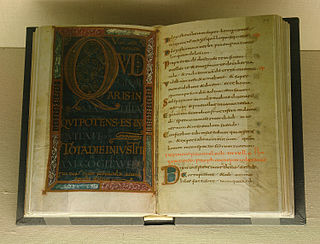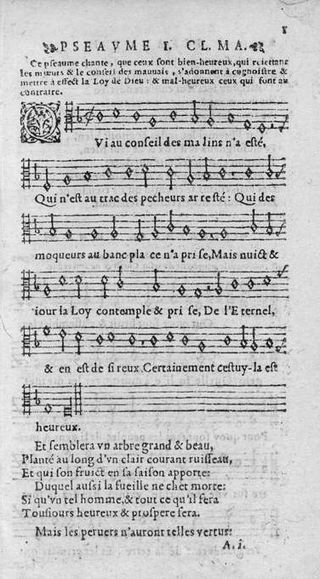
Vespers is a liturgy of evening prayer, one of the canonical hours in Catholic, Eastern Orthodox, Oriental Orthodox, and Lutheran liturgies. The word for this prayer time comes from the Latin vesper, meaning "evening".

A psalter is a volume containing the Book of Psalms, often with other devotional material bound in as well, such as a liturgical calendar and litany of the Saints. Until the emergence of the book of hours in the Late Middle Ages, psalters were the books most widely owned by wealthy lay persons. They were commonly used for learning to read. Many psalters were richly illuminated, and they include some of the most spectacular surviving examples of medieval book art.
In the context of Christian liturgy, a canticle is a psalm-like song with biblical lyrics taken from elsewhere than the Book of Psalms, but included in psalters and books such as the breviary. Of special importance to the Divine Office are three New Testament Canticles that are the climaxes of the Offices of Lauds, Vespers and Compline; these are respectively Benedictus, Magnificat and Nunc dimittis. There are also a number of Canticles taken from the Old Testament.

Lauds is a canonical hour of the Divine office. In the Roman Rite Liturgy of the Hours it is one of the major hours, usually held after Matins, in the early morning hours.
Defender(s) or The Defender(s) may refer to:
An aria is a self-contained expressive melody for one voice usually with orchestral accompaniment.
Benedictus, Latin for "blessed" or "a blessed person", may refer to:

The Liturgy of the Hours, Divine Office, or Opus Dei are a set of Catholic prayers comprising the canonical hours, often also referred to as the breviary, of the Latin Church. The Liturgy of the Hours forms the official set of prayers "marking the hours of each day and sanctifying the day with prayer." The term "Liturgy of the Hours" has been retroactively applied to the practices of saying the canonical hours in both the Christian East and West–particularly within the Latin liturgical rites–prior to the Second Vatican Council, and is the official term for the canonical hours promulgated for usage by the Latin Church in 1971. Before 1971, the official form for the Latin Church was the Breviarium Romanum, first published in 1568 with major editions through 1962.

Exclusive psalmody is the practice of singing only the biblical Psalms in congregational singing as worship. Today it is practised by several Protestant, especially Reformed denominations. Hymns besides the Psalms have been composed by Christians since the earliest days of the church, but psalms were preferred by the early church and used almost exclusively until the end of the fourth century. During the Protestant Reformation, Martin Luther and many other reformers, including those associated with the Reformed tradition, used hymns as well as psalms, but John Calvin preferred the Psalms and they were the only music allowed for worship in Geneva. This became the norm for the next 200 years of Reformed worship. Hymnody became acceptable again for the Reformed in the middle of the nineteenth century, though several denominations, notably the Reformed Presbyterians, continue the practice of exclusive psalmody.
Still Falls the Rain may refer to:
Psalms is a book of the Hebrew Bible and the Christian Old Testament.
The Canticles constitute a series of five musical works by composer Benjamin Britten. The pieces were written at various points in his career, with three of them written as memorials. Instrumentation differs on each piece, and several are based on non-sacred texts. A review in Opera Today notes, "Britten didn't draw upon the Scriptures for the texts of his canticles, which resemble cantatas more than church hymns in scale and structure, but an intense religious spirit pervades them all." Musicologist Peter Evans notes the works contain a "mood of spiritual elevation intense enough to demand realization in an ambitious musical structure".
Abraham and Isaac may refer to:
The Grail Psalms refers to various editions of an English translation of the Book of Psalms, first published completely as The Psalms: A New Translation in 1963 by the Ladies of the Grail. The translation was modeled on the French La Bible de Jérusalem, according to the school of Fr. Joseph Gelineau: a simple vernacular, arranged in sprung rhythm to be suitable for liturgical song and chant. All official Catholic English translations of the Liturgy of the Hours use the Grail Psalms.
The Daily Office is a term used primarily by members of the Episcopal Church. In Anglican churches, the traditional canonical hours of daily services include Morning Prayer and Evening Prayer, usually following the Book of Common Prayer. As in other Christian traditions, either clergy or laity can lead the daily office. Most Anglican clergy are required to pray Morning and Evening Prayer daily.

Canticle IV: The Journey of the Magi, Op. 86, is a composition for three male solo voices and piano by Benjamin Britten, part of his series of five Canticles. It sets the text of T. S. Eliot's poem "Journey of the Magi", retelling the story of the biblical Magi. The work was premiered in June 1971 at the Aldeburgh Festival by James Bowman, Peter Pears and John Shirley-Quirk, with Britten as the pianist. It was published the following year, dedicated to the three singers.

Canticle II: Abraham and Isaac, Op. 51, is a composition for tenor, alto and piano by Benjamin Britten, part of his series of five Canticles. Commissioned to be performed as a fundraiser for the English Opera Group, it sets the story of Abraham and Isaac from the Chester Mystery Plays. Britten assigned the tenor voice of Peter Pears to Abraham, the alto of Kathleen Ferrier to Isaac, and both singers singing in homophony to the voice of God. The work was premiered on 20 January 1952 by Pears and Ferrier, with Britten as the pianist. It was published by Boosey & Hawkes in 1952, dedicated to the singers.
Canticle I: My beloved is mine and I am his, Op. 40, is a composition for high voice and piano by Benjamin Britten, the first part of his series of five Canticles. It was composed for a memorial concert. The text is taken from Francis Quarles's poetry based on the biblical Song of Songs. It was published by Boosey & Hawkes under the shorter title Canticle I: My beloved is mine.





